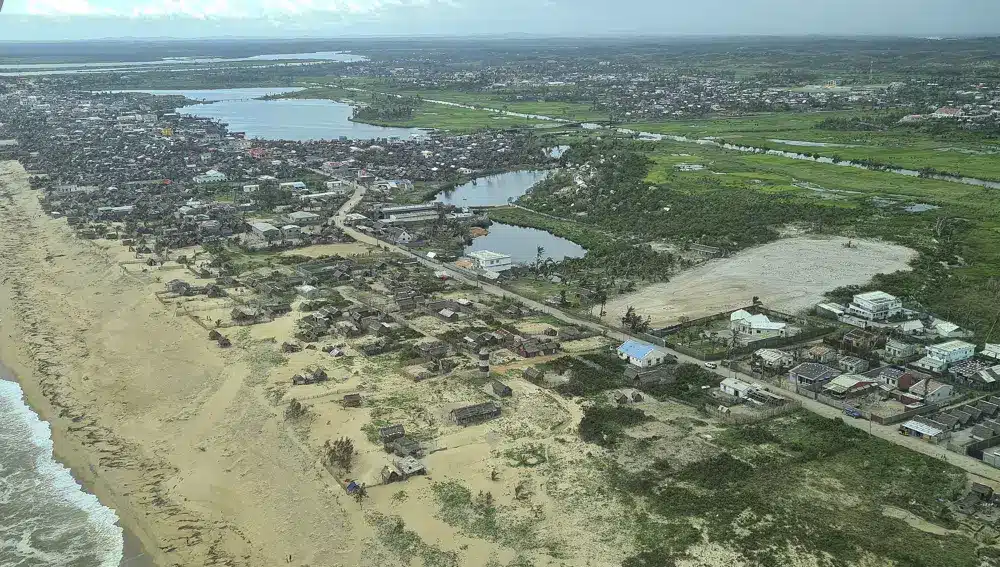Finance
Madagascar Faces ‘Catastrophic’ Hunger After 3 Cyclones

MANANJARY, Madagascar – Southeast Madagascar has been hit by three powerful storms in a year, resulting in “catastrophic” famine in remote, inaccessible places that have received little international attention, according to humanitarian organizations.
Cyclone Batsirai struck in February 2022, followed by Cyclone Emnati two weeks later. Then, in February of this year, Cyclone Freddy landed on the Indian Ocean island. According to a report by UNICEF and Madagascar’s National Office for Nutrition, the combined impact affected 60%-90% of farming regions in the southeast and largely destroyed food crops.
People like Iavosoa, a distraught young mother whose 10-month-old daughter, Soaravo, was at risk of dying before her first birthday due to acute malnutrition, feel the pain. Iavosoa, who only supplied her first name to protect her privacy, also has a 3-year-old son who is malnourished.
Last month, a team from the humanitarian organization Doctors of the World brought her children and two other severely malnourished children, both under the age of two, to a hospital in the city of Mananjary on Madagascar’s east coast after a group of parents and their children were discovered walking through the bush to reach the nearest health center.
Soaravo groaned softly at the hospital as her mother rocked the infant to soothe her. The child weighed only 2 kilograms (4.4 pounds) and resembled a preterm infant, with eyes nearly too wide for her tiny skull. Doctors say she should weigh four to six times her age.
Southeast Madagascar has been hit by three powerful storms in a year, resulting in “catastrophic” famine.
“If my daughter is in this state, it’s because we don’t have enough food where we live,” said Iavosoa. “I was sick with dysentery for two months.” I was almost out of milk. I was completely exhausted. My hamlet is three hour walk from the first basic health center. I couldn’t pamper myself because I couldn’t travel such a long distance.”
“And then she (Soaravo) became ill as well.” Then came Cyclone Freddy. “It destroyed our house and ravaged our village,” she claimed.
Iavosoa wore a tattered T-shirt and a piece of fabric wrapped around her waist, saying she wasn’t sure of her age but assumed she was between 21 and 24. She needed footwear. Everything she owned was wrapped in a cotton bundle on the hospital floor. She is a single parent.
Iavosoa looked at her daughter, a dismayed expression on her face. “She’s just turned 10 months old,” she explained.
The families spotted walking roughly 30 kilometers from the hospital were discovered by chance when a Doctors of the World team went to assess the quality of health facilities in places beyond Mananjary, according to Joaquin Noterdaeme, a coordinator with the organization known in French as Médecins du Monde.
Soaravo was treated for an illness and diarrhea, and malnutrition was addressed with a special milk formula. Doctors predicted that she would be hospitalized for at least a month. Her mother and brother moved in with her because they had nowhere else to go.
According to a Feb. 28 report by UNICEF and the National Office for Nutrition, more than a quarter of the population in Madagascar’s southeastern area, or around 870,000 people, do not have enough food and are at risk of hunger.
According to humanitarian organizations, Soaravo and the other hospitalized youngsters are a drop in the bucket.
“This is a nutrition emergency,” said Jean-Francois Basse, UNICEF’s representative in Madagascar, describing the situation in rural regions as “catastrophic.”
The cyclones left scars on the hospital as doctors worked to save Soaravo’s life. Some of its structures are nothing more than shells. The walls were barely standing, but parts of the roof had collapsed. Some patients were treated outside in a tent.
Few trees stand upright in and around Mananjary, which bore the brunt of the cyclones racing in from the Indian Ocean and where Freddy made landfall. They were ripped out or left lurching at 45-degree angles by the cyclones, demonstrating the intensity of the wind brought by the storms.
Homes were demolished, rebuilt, then demolished again.
According to Brian Willett, head of mission in Madagascar for Doctors Without Borders, also known as Médecins Sans Frontières, people living in remote districts like coastal Nosy-Varika and the mountainous region of Ikongo were extremely vulnerable to hunger before the cyclones and children across southeast Madagascar experienced chronic malnutrition.
“But, with the repeated climate shocks of the past year, their resilience has been exceeded,” he said. “Today, one in every four children is acutely malnourished.” These children face death if they do not receive medical attention.”
Willett suggested that mothers who couldn’t feed their children would participate in “acts of desperation,” referring to stories that some were selling their children to save them from famine.
SOURCE – (AP)
Finance
Economist Warns Over Canada Slipping into a Cashless Society

Canadian economist Carlos Castiblanco believes that Canada should follow in the footsteps of other countries and enact legislation to protect the use of cash in the country.
Castiblanco, together with the group Option Consommateurs, is urging the Trudeau government to follow the lead of other jurisdictions in the United States and Europe in enacting legislation to slow the transition to a cash-less society.
He stated that barely 10% of transactions in Canada now use cash, and that Canada must defend cash now before more merchants begin to refuse it totally.
It is vital to act now, he told CBC Radio’s Ontario Today, before businesses begin removing all of the infrastructure required to handle and manage actual cash.
“They are already used to dealing with cash, so this is the moment for the Trudeau government to act, before it is more complicated.”
A recent online poll of almost 1,500 people commissioned by a different group, Payments Canada, discovered that the majority of respondents were concerned about the potential of cashless stores and preferred to keep the ability to use cash.
Bank fees in Canada
Above all, cash has no bank fees, is not vulnerable to privacy breaches, and may be utilized during internet outages.
The Payments Canada paper, “Social policy implications for a less-cash society,” suggests legislative action, saying that cash-based transactions have decreased from 54% in 2009 to 10% by 2021.
Aftab Ahmed, one of its writers, explained who would be most affected by a cashless future in a recent piece for Policy Options, the Institute for Research on Public Policy’s online magazine.
“For many Canadians, including Indigenous people, homeless people, aging citizens, and others who are vulnerable, cash is both a beacon of economic stability and a source of financial insecurity. “Cash is an emergency lifeline and a symbol of cultural traditions,” Ahmed explained.
“Canada must avoid sleepwalking into a cashless future and instead recognize the risk of exacerbating financial exclusion of those most vulnerable.”
Refusing to accept cash
The currency issue has already caught fire outside of Canada, according to Castiblanco, with some US states and territories beginning to pass legislation to preserve access to cash.
In 2019, Philadelphia became the first city in North America to prohibit “any person selling or offering for sale consumer goods or services at retail from refusing to accept cash as a form of payment.”
Other U.S. cities, including New York, Seattle, and Los Angeles, have since taken action on the issue.
In New York, the policy recommends fines of up to $1,500, with the Councillor who proposed the guidelines claiming that prohibiting cashless transactions preserves privacy, equity, and consumer choice.
European countries such as Norway, Spain, and Ireland have enacted similar legislation. In Ireland, the rule would mandate cash transactions at companies like as pharmacies and grocery stores that supply basic goods and services.
Source: CBC
U.K News
UK National Debt Rises to the Highest in 62 Years

UK national debt grew this month to its highest level as a share of the economy since 1961, according to figures released on Friday, adding to the financial issues that the new administration will face when it takes office following a general election in two weeks.
The UK national debt, excluding state-controlled banks, hit 2.742 trillion pounds ($3.47 trillion), or 99.8% of annual GDP, in May, up from 96.1% the previous year, according to the Office for National Statistics.
The increase came despite somewhat lower-than-expected government borrowing in May, which was 15.0 billion pounds, compared to experts’ median projection of 15.7 billion pounds in a Reuters survey.
Following an election on July 4, Britain appears to be on the verge of a change of government, with Keir Starmer’s Labour Party leading Prime Minister Rishi Sunak’s Conservatives in surveys.
During the COVID-19 epidemic, state debt in Britain skyrocketed, and the public finances have been hampered by poor growth and a 16-year high in Bank of England interest rates.
Western Nations Debt
Most other Western countries had significant rises in debt during the same period, although British debt levels are lower than those of the United States, France, and Italy.
A person enters the Treasury government building in London, Britain, on March 5, 2024. REUTERS/Toby Melville/File Purchase Licensing Rights opens a new tab.
Borrowing in the UK totaled 33.5 billion pounds in the first two months of the fiscal year, 0.4 billion more than the same period in 2023 but 1.5 billion pounds less than government budget estimates expected in March.
Capital Economics consultants warned that the lower-than-expected borrowing figures represented less public investment and would provide little comfort to Britain’s future finance minister.
“They do little to reduce the scale of the fiscal challenge that awaits them, in part because of the upward pressure on the debt interest bill from higher interest rates,” said Alex Kerr, an assistant economist at Capital Economics.
Labour and the Conservatives want to keep to existing budget rules that require official estimates – most recently updated in March – to indicate that debt as a proportion of GDP is dropping in the fifth year of the forecast.
Higher interest rates than projected in March’s budget left Britain’s next chancellor with only 8.5 billion pounds of freedom to meet these standards, down from the historically low 8.9 billion in March, Kerr noted.
Both Labour and the Conservatives have committed not to raise income tax, value-added tax, or other major levies, but government budget predictions in March revealed that tax as a percentage of GDP was on track to hit its highest level since 1948.
Source: Reuters
Canada’s Household Debt Nears $3 Trillion Under Trudeau
U.K News
Bank of England Keeps Key Interest Rate at 5.25% Despite Inflation Falling

The Bank of England maintained its main interest rate at a 16-year high of 5.25% on Thursday, despite inflation falling to its target of 2%, with several policymakers warning that a premature decrease may spark another wave of price increases.
Seven of the nine members of the bank’s ruling Monetary Policy Committee voted against a rate drop for the second week in a row, while two supported one. Interest rates have been constant since August, following a series of rises.
The statement accompanying the vote made it plain that there was disagreement on the forecast for inflation, with some expressing concern about continued significant price increases in the services sector, the key driver of the British economy.
“It’s good news that inflation has returned to our 2% target,” said Bank of England Governor Andrew Bailey, who voted to maintain current policy. “We need to be sure that inflation will stay low and that’s why we’ve decided to hold rates at 5.25% for now.”
The decision will likely dismay the ruling Conservative Party ahead of the United Kingdom’s general election in two weeks. Prime Minister Rishi Sunak would have seen a cut as good economic news, especially if it came with a drop in mortgage rates.
Upcoming UK Election
The panel maintained that the upcoming election, which the main opposition Labour Party, led by Keir Starmer, is generally expected to win, did not influence its conclusion. It stated that the decision was, as always, based on meeting the 2% inflation objective “sustainably in the medium term.”
Economists anticipate a rate decrease is on the way, either at the bank’s next policy making meeting in August or the one following in September. They expect clear evidence by then that inflation will remain close to the target for the next year or two.
“We continue to believe that the MPC will ease restrictive policy beginning in the summer and deliver two rate cuts this year,” said Sanjay Raja, Deutsche Bank’s senior U.K. economist.
The reduction in the primary inflation measure to a near three-year low of 2% in the year to May does not imply that prices are falling; rather, they are rising at a slower rate than they have in recent years during a cost-of-living crisis that has resulted in reduced living standards for millions in Britain.
Central banks worldwide dramatically increased borrowing costs from the lows seen during the coronavirus pandemic, when prices began to rise, first due to supply chain issues accumulated during the pandemic and then due to Russia’s invasion of Ukraine, which pushed up energy costs.
Bank of England unduly cautious
Higher interest rates, which cool the economy by making borrowing more expensive, have helped to reduce inflation, but they have also weighed on the British economy, which has hardly expanded since the pandemic’s recovery.
Critics of the Bank of England argue that it is unduly cautious about inflation and that keeping interest rates too high for too long will put undue strain on the economy. It is an accusation that has also been leveled at the United States Federal Reserve, which has held interest rates constant in recent months.
“Given that the U.K. has moved onto a milder inflationary trajectory, rate setters remain overly cautious about the likelihood of loosening policy, risking impeding the U.K.‘s growth prospects,” said Suren Thiru, economics director at The Institute of Chartered Accountants in England and Wales.
Some central banks, like the European Central Bank, have begun to decrease interest rates as inflationary pressures have subsided. On Thursday, the Swiss National Bank cut its main interest rate by a quarter of a percentage point to 1.25%.
Source: The Associated Press
-
World2 weeks ago
Former President Trump Survives Being Shot at Pennsylvania Rally
-
Tech4 weeks ago
Huawei Launches 5G-A Pioneers Program at MWC Shanghai 2024: Paving the Way for a Connected Future
-
Sports4 weeks ago
NBA Draft: Kyle Filipowski Withdraws Unexpectedly From The First Round
-
Tech4 weeks ago
ChatGPT Answers Undiscovered Questions and Outperforms Students.
-
News4 weeks ago
US Supreme Court Rejects Drug Deal that Protects the Sackler Family
-
Health4 weeks ago
US Health Agency Issues Dengue Virus Infection Warning





















